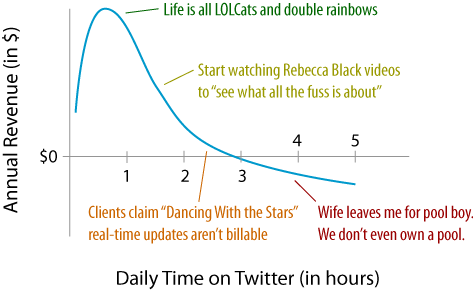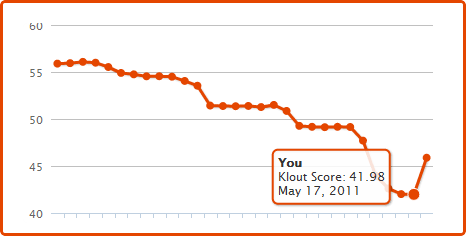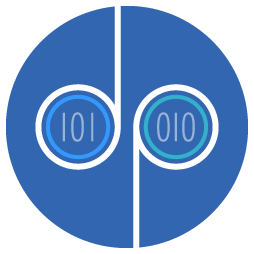30 Days without Social Media
May 23, 2011 — By Dr. PeteRecently, I spent 30 days off of social media, just to clear my head. Some days, I think social media is the greatest thing ever invented – 9 hours, 157 links, and 3 Justin Bieber memes later, I start to have my doubts. The first 30 minutes/day I spend on Twitter is great for business, but I imagine the graph of productivity by time spent looks something like this:

The world kept turning.
It's always a bit disappointing to realize that you're not the center of the universe. I went offline for 30 days and no one died, no one called the cops, and it still takes roughly 365 days for the Earth to orbit the Sun. Bin Laden is still killed and Kate and Will are still married, even though I didn't talk about those events on Twitter. No one was snuffed out of existence because I didn't Like them on Facebook (unless, by ceasing to exist, everyone instantly forgot about them – you never know).
I went through withdrawal.
We don't like to think of addiction as something that applies to us – that's a word reserved for meth heads and Charlie Sheen. I'm not your typical addict. One of my grandfather's was an alcoholic, and yet I can have a drink every week or two with no problems. I can walk into a casino in Vegas, play the $20 I put aside on the slots, and walk out, chalking up the loss as entertainment.
Sometimes, though, my behavior online just isn't healthy. I don't know if it's technically addiction, compulsion, or just avoidance, but the label doesn't matter. If you repeatedly click on the same half-dozen sites for an hour (when they didn't even update) to put off doing what's really important to you, that's an addiction, in every practical sense of the word. Social media's standing between you and real life at that point, and you have to fight to find the balance.
I think I realized the balance was tipping the wrong way for me when I was playing Mafia Wars a couple of years ago. I had 2 accounts in play, I was 600+ level on one, and I had a multi-sheet Excel workbook to track my inventory. One day, we were out in California with my wife's dad – he was in the hospital and only had a few days left to live. I had to take a break from the hospital room and went down to the lobby to check email and unwind. A few minutes later, I was checking my Mafia Wars character to make sure everything was up to date.
There was nothing wrong with needing a break in that moment, but suddenly the absurdity of worrying about worthless stats on an imaginary character in a pointless game really sunk in. Here I was, surrounded by real life, and I needed to take it in, for better or worse. The sad thing is that I didn't even like playing the game – it had become just another item on the to-do list and was actually creating stress. I quit and deleted the other account soon after.
When I started the challenge, I almost had to sit on my hands to keep from checking Facebook and Twitter. I almost visited social media sites without even realizing what I was doing, until I eventually had to remove all bookmarks and block the sites (thank you, StayFocusd). I didn't realize it was quite that bad until I tried to quit.
I got a lot more done.
The point of this post isn't to bash social media (keep reading), but the unavoidable reality is that all of this participation takes a lot of time, especially when you're in an industry where everyone is online all the time. Part of my challenge was to mark out some time for a project, and I decided to write 30GO30's first e-book (coming soon). In 2 weeks, it was basically done. Sure, it's only 30 pages, but I expected it to take 2 months.
So, I started an infographic I've been putting off. It's mostly done. I finished reading 3 books, and one of them was 500 pages long. I came up with guest-post ideas to cover the next 2-3 months, wrote some of them, and even illustrated a couple. Some days, I had my client work done, put in some time on long-term projects, and realized it was only two-o-clock in the afternoon. I'm not trying to show off – I'm just sincerely amazed at the difference.
I got to write just for me.
I live for approval. That's not healthy either, but that's a whole other post. I decided to keep up my posting schedule (plus a couple of posts for clients) during my 30-day hiatus, and something very interesting happened. I suddenly had to write for me. It wasn't about hitting Publish and waiting to see how many Likes and Re-Tweets I got – it was about writing and rewriting until I was happy with what I had created. It was strange not to have an echo chamber to shout into, but it was liberating, too.
My Klout score dropped!
If you're on Twitter much or work in marketing, you're probably familiar with Klout. Apparently, being off Twitter for 30 days was enough to drop my score from 56 to 42. That's 14 points, or a 25% drop in online prestige!

I felt disconnected.
You're probably starting to wonder why I ever let the challenge end. About 2 weeks into it, I felt the compulsive side of things really start to fade. I wasn't jonesing for a Twitter fix, and I was feeling good about getting my focus back. At the same time, though, I really started to wonder what people were up to. I'm not saying that online communication is 100% "authentic" or the same as a good in-person chat with an old friend, but as someone who works from home, it's often how I connect to people, friends and peers. I started to genuinely miss it.
It affected my work.
I actually did this experiment about 2 years ago, and one of the big differences I noticed this time around was how much more important social media is to my daily work. It's not just how I keep up and stay relevant to the outside world – it's a kind of currency. If I want people to support my work, I naturally need to support theirs. It's not just quid-pro-quo – I work in an industry full of amazing people doing excellent work and I want to support them. After even a week offline, I started to feel like I was letting people down.
Frankly, it also made my own projects nearly impossible to promote, including (and especially) 30GO30. For better or worse, social media is critical to my business in 2011.
So, here I am again.
The reality, for me, is that social media is a big part of my life. I don't just mean for entertainment or in some vague, elusive sense of "branding". I estimate that it's driven roughly 60-70% of my current customer base. It's also important for my personal life – staying in touch with friends I don't see much, meeting new friends, and getting to know colleagues better.
So, once again, it comes down to the "happy medium". I put it in quotes because the uphill slog of reaching the middle ground rarely seems to be happy, in my experience. There's usually a lot of kicking and screaming involved, plus some sobbing in the corner. Eventually, though, we find it, if it doesn't kill us first.
For me, it's just the recognition that social media has real value to a point, but I have to make time to shut it off and focus on what matters to me. Carving out 30-minute blocks for projects, for example, has been a huge productivity boost. I don't have to quit Twitter and Facebook cold turkey, but the world will keep spinning if I don't hit refresh every 15 seconds.
Home | Who is Dr. Pete? | Are You A Real Doctor? | Can I Hire You? | Archive
©2026 User Effect, LLC.
